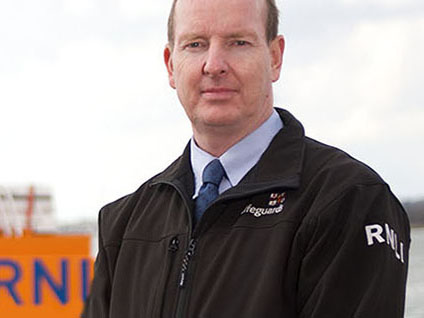Landmark Certificate Candidate Supports Lifesaving Heroes
Case Study: Peter Dawes - RNLI
The 175,000th candidate to pass their NEBOSH National General Certificate in Occupational Health and Safety (NGC) is a true lifesaver. From the age of just 13, Peter Dawes volunteered at Surf Life Saving Queensland in Australia, which in turn led to a lifelong career of high octane sea rescues, involving speedboats, jet skis and even helicopters.

However, Peter, like so many who have performed heroic acts to save lives, plays down this aspect of his working life. Instead he prefers to talk about his current role, which he describes as being “all about supporting other people who are heroes.”
Peter, 54, works for the Royal National Lifeboat Institution (RNLI) as their Lifesaving Services Manager. The RNLI is a charity providing an on call 24-hour lifeboat search and rescue service around the UK and Ireland, and a seasonal lifeguard service. Its team of volunteer rescuers save many lives every year, responding to 23 lifeboat call-outs every day. The RNLI’s services include flood rescue and providing safety advice, and to operate effectively it depends on many fundraisers. It has 237 lifeboat stations, protects more than 200 beaches and has over 30,000 volunteers. This infrastructure requires all kinds of support, from training to providing the right kind of equipment.
Procedures need to be developed, communicated and kept up-to-date. And of course, as in all workplaces, people need to be kept safe and healthy. It is with this overall support where Peter and his team come in.
“We provide resilience and assurance,” Peter explains, “anything from processes to trialling new equipment. We make sure the teams get the support they need, have the tools to do their job, and also that things function how they should.”
Peter is also keen to highlight the role the RNLI now plays in providing safety advice. Its recent ‘Safety Week” and ‘Safety Get Onboard‘ campaigns encourage proactive safety to ‘stop things happening before people get hurt.’
Being trained and qualified “to do a job appropriately” is something that Peter “strongly believes in.” It is why, for the health and safety side of things, Peter asked all managers working with him at the RNLI to sit the NEBOSH National General Certificate alongside him. From his own perspective, he wanted to “convert” his Australian safety qualifications to a UK equivalent. For both him and his team, sitting the NEBOSH Certificate had immediate benefits.
“We were in the process of refreshing and updating several hundred pieces of operational guidance at the time,” he told us. “The focus of a lot of that guidance was on the safety aspects. The course really helped the team identify the legal requirements and more importantly to formulate the practical measures to implement them. It is a big investment for any organisation to have your staff or volunteers do that level of training, but the rewards and benefits were there straight away.”
Peter describes his pride in being the 175,000th successful NGC candidate, in the context of all others who have passed before him.
“It is something that is good for all industries. 175,000 is an awful lot of people that are better trained at looking after their colleagues and the companies they work for. From an RNLI perspective we now have a few people within that 175,000 and I hope that reflects the way we use best practice. I’m very impressed with the way the qualification is recognised throughout industry and internationally as well. I think that’s a reflection of the standards it sets."
“From the point of view of managing safety, the NEBOSH National General Certificate is definitely a stand out qualification.”
